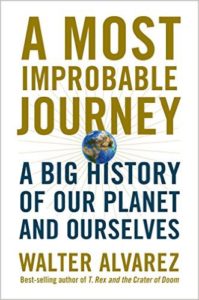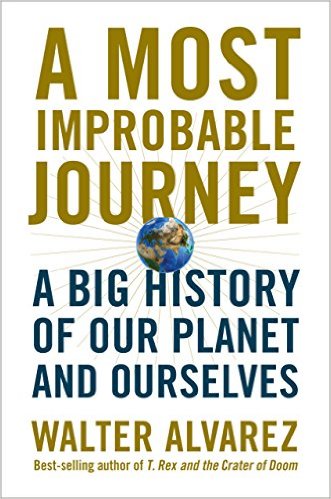
UC Berkeley professor Walter Alvarez tackles the emerging field of Big History from his perspective as a geologist, viewing himself as “a historian of the Earth.” In A Most Improbable Journey, he writes about the universal context in which human life has emerged. Beginning with the Big Bang and rushing through the intervening 13.8 billion years at top speed, he focuses on the geological processes through which the Earth was formed and progressively re-formed in ways that have determined the course of human events to this day.
Estimated reading time: 5 minutes
“The topography and climate of continents,” he writes, have controlled the pattern of settlement and the lines of communication throughout history; resources are distributed in an irregular way across the continents; and land warfare is carried out on a geographical chessboard. The geography of the oceans has determined routes of exploration, trade, and migration and has set the stage for naval warfare.”
A Most Improbable Journey: A Big History of Our Planet and Ourselves by Walter Alvarez (2017) 246 pages ★★★★☆
A planet in a constant state of flux
And all this, he emphasizes, is the result of the particular configuration of the continents at this moment in geological history. Because of continental drift, the shape and distribution of both land and sea have radically changed numerous times since the Earth was created 4.5 billion years ago. For example, to cite just two minor examples of the Earth’s changeability, he notes that “California is further away from Utah than it used to be.” And the coast of Northern California once extended to what we know today as the Farallones Islands. If your taste runs to nonfiction, you may well find this book as enjoyable as the best thriller.
An unusual contribution to Big History
The discipline of Big History is less than three decades old. Founded by David Christian, an American historian then teaching in Australia, its mission is to transcend the boundaries of written history and help us see ourselves in the context of an inconceivably vast and complex universe. Instead of focusing on the mere 5,000 years of recorded history, Big Historians typically direct our attention far backwards to the beginning of time itself. However, in most treatments, Big History explores the astronomical, physical, chemical, and geological realities of our past only as prologue to an abbreviated world history. Walter Alvarez takes a different approach in A Most Improbable Journey. Though he frequently dips into other scientific disciplines, his focus throughout is on the ways in which geological science can help us understand the shape our lives and the character of the planet we share.
Human life is an accident
In his short and highly readable book, Alvarez frames the story of the ascension of the human species as an accident. “At innumerable moments . . .,” he writes, “history could have taken different paths than the one our world actually did take, resulting in a human situation different from the one we have today—or possibly no human situation at all!” He emphasizes that “the human situation is balanced on a knife edge of improbability.” This is the principal theme of his book.
Again and again, Alvarez returns to this point. Writing about the improbable evolution of our bodies, he asks, “What if bilateral symmetry had never appeared? What if the movable jaw had not evolved? What if the dinosaurs had not been killed off? . . . if other biological inventions we can barely imagine had shaped the path of evolution? As with so much else in Big History, it was a very particular and unlikely sequence of events that gave us the characteristics of our human bodies.”
A very personal perspective
Alvarez bookends his account with references to the theory that has put him on the map, so to speak: the hypothesis that the crash-landing of a meteor or comet in the Yucatan Peninsula caused the extinction of the dinosaurs and the rise of mammals to supremacy on the Earth. The improbability of this event—unlike anything in the previous half-billion years—reinforces his thesis that the emergence of our species is due to a long sequence of highly unlikely occurrences.
Although Alvarez dips into geological jargon from time to time and offers more about the history of geological science than any lay reader might wish to know, A Most Improbable Journey is nonetheless entertaining. No doubt the book closely parallels the popular course in Big History he teaches at UC Berkeley. My only complaint is Alvarez’ unaccountable love for unnecessary emphasis. Surely, it’s not necessary to punctuate nearly every interesting observation with an exclamation mark! The frequency of this aberrant punctuation is annoying.
About the author
Walter Alvarez is a professor in the Earth and Planetary Sciences Department at the University of California, Berkeley. A geologist, he is best known for the hypothesis that a meteor impact on the coast of Yucatan 66 million years ago led to the extinction of the dinosaurs, which he developed with his father. The father, Luis Walter Alvarez, was an experimental physicist who paved the way for the discovery of whole new families of subatomic particles, work for which he won the Nobel Prize in Physics.
For related reading
This is one of the books I’ve included in my post, Gaining a global perspective on the world around us. It’s also among the many Good books by Berkeley authors.
You may enjoy browsing through 20 top nonfiction books about history. If you’re looking for a broader view of human history, check out New perspectives on world history.
And if you enjoy reading history in fictional form, check out 20 most enlightening historical novels.
And you can always find my most popular reviews, and the most recent ones, on the Home Page.




























> The improbability of this event—unlike anything in the previous half-billion years—
That’s not true. As has been well-known since 1982, there have been several other mass extinction events, roughly half also apparently caused by a large asteroid or comet strike, although the locations of the older ones have been masked by geological changes.
https://en.wikipedia.org/wiki/Extinction_event
In particular, the Permian-Triassic event 252 million years ago was the biggest, killing off about twice the %age of all species as this famous Cretaceous-Paleogene one. I’m sure this is the reviewer’s mistake, not Alvarez’s.
You misunderstood both the author’s meaning and mine. It was not the extinction that was improbable. It was the METEOR STRIKE. Yes, there have been at least four if not five extinctions previous to the current one, which is widely referred to as the Sixth Extinction.